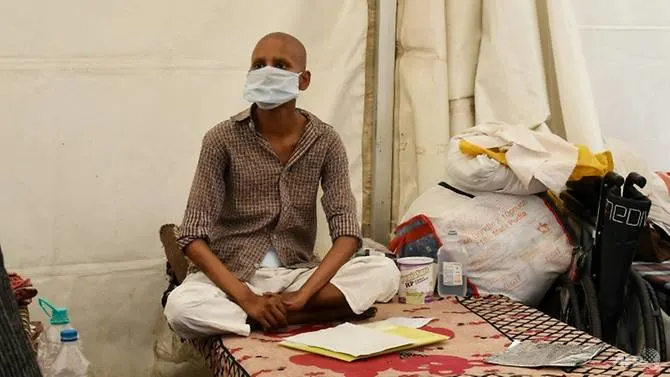Pandemic spells death sentence for India's non-virus patients
12 April, 2020

Liver patient Shahjahan's family feared the worst whenever a New Delhi consumer hospital informed her to leave because her bed was needed found in a coronavirus unit.
The 40-year-old mother have been on a ventilator with an acute infection for nearly two weeks when she kept Lok Nayak medical center on Tuesday night (Apr 7).
She died at her house in Delhi another morning. Other hospitals had switched her away as a result of the pandemic.
"The authorities just kept her to die. Even though they known us to another medical center, they refused to provide us an ambulance," explained Mohammad Khalid, a relative of Shahjahan.
The capability of medical facilities all over the world has been stretched by the surge of COVID-19 patients as outbreaks worsen in many countries.
It can cause people with other life-threatening illnesses to lose out on vital care - especially in spots like India, where health care systems are shakier.
Dozens of men and women with serious medical ailments are camped outdoors India's national medical institute found in tents setup by the Delhi federal government.
Most of them had travelled from additional cities for now-cancelled appointments and cannot return back because of transport restrictions beneath the nationwide lockdown that started on March 25.
Outpatient departments in the All India Institute of Medical Sciences (AIIMS) closed, forcing cancer patients and other folks with deadly ailments to take shelter on a grimy pedestrian subway and less than canvas.
Though aid groups have provided plenty of food and medicine, it turned out 12 hours since Saryu Das had eaten when AFP met him.
SUBWAY DEATH
His son, who had mouth cancers, lay on a thin mattress along with his face included in a scarf. Flies hovered around him. Four times later, he died.
Waste material littered the subway ground that's now home to more than 10 households unable to make contact with their hometowns, with the mattresses as a result close that public distancing was impossible.
The AIIMS didn't immediately react to requests for comment on the death and the patients outside. But hospitals over the vast country of 1 1.3 billion persons have been put on alert and its own virus loss of life toll is currently above 280.
When Prime Minister Narendra Modi announced the lockdown, he gave an incredible number of Indians taking life-saving medications just four hours' notice.
Amulya Nidhi, a overall health activist located in Madhya Pradesh status, told AFP the government knew that vulnerable people - including people that have silicosis and tuberculosis, which kills thousands every year in India, in addition to pregnant women - were at risk.
"I'm getting distress telephone calls from across India over usage of basic medicines and treatment," said Nidhi.
SHUT OUT
"It is vital to expand healthcare facilities to fight COVID-19. Simultaneously, hospitals and ambulances need to be designed for patients with other concerns," he said.
In February, 39-year-good old Maitri Lakra was found to be in the initial stages of tongue cancer. Being HIV-positive only added to her woes.
Doctors in AIIMS referred her to their campus in Haryana state for pre-surgery exams, which started mid-March. But 10 days after, she was advised that all radiology appointments had been postponed.
As her condition deteriorated - bleeding from the tongue and in unbearable pain - she filed a petition with the Delhi High Court and has finally been admitted to AIIMS.
"Her cancer reaches stage three now. Acquired she received treatment promptly, this would not have happened," her boy Debashish Dag said.
Vinay Shetty, from the Mumbai-based Think Foundation that works with people with the bloodstream disease thalassaemia and organises blood vessels donation camps, said those needing transfusions are being among the most vulnerable.
"Those needing drugs might not are having issues, but anybody needing blood might," Shetty said, adding the federal government had to motivate blood donors.
Public health professional Anant Bhan stated India's give attention to COVID-19 could result in various other diseases such as for example tuberculosis spreading.
"Members of the family in lockdown with tuberculosis sufferers are at risk. After the lockdown is taken away and people start interpersonal interactions, it might spread the disease the same manner COVID-19 clients could spread an infection," Bhan said.
"Deaths due to COVID-19 rather than directly of it really is something that we must worry about. We must ensure those who need essential services have it," he said.
And time is already running out for Shahjahan's fellow patients on the subway and tents outside the house AIIMS.
"The doctors explained they cannot do my chemotherapy program now and that they can call me when the lockdown is lifted. That call might take weeks," said 25-time good old Rampur resident Mohammed Shan-e-Alam.
"Right now I can't go home and I can't go to the hospital."
Source:
TAG(s):
